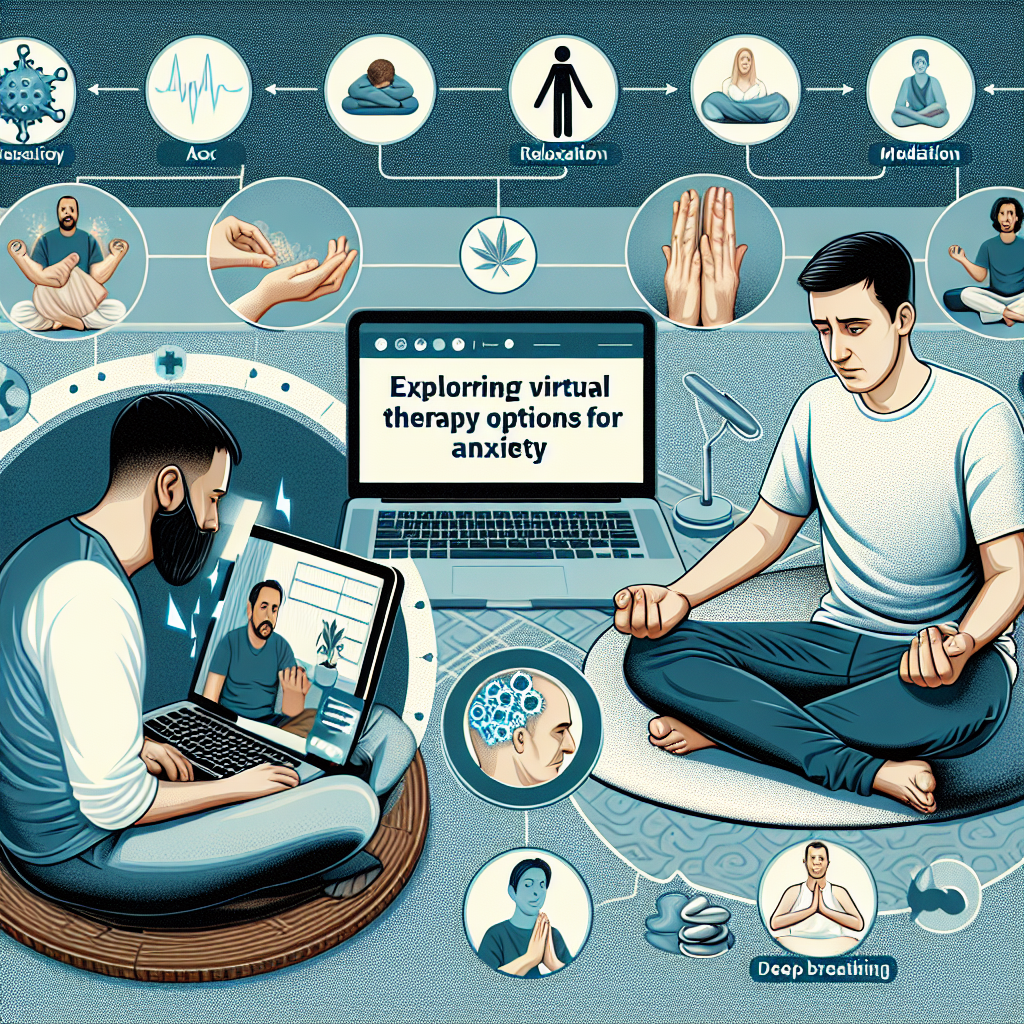In today’s fast-paced world, it’s no surprise that anxiety disorders are on the rise. The good news is that virtual therapy options are now widely available to help those struggling with this common mental health issue. From online counseling sessions to mobile apps and video therapy platforms, there are a plethora of virtual resources at your fingertips. This comprehensive guide will delve into the world of virtual therapy for anxiety, exploring the various options and benefits they offer. Many employers now offer mental healthcare to their workforce. Whether you’re looking for support in managing your anxiety or simply curious about the latest advancements in mental health services, this guide has you covered. Join us on a journey of self-care and empowerment as we navigate the landscape of virtual therapy options for anxiety.
Understanding Virtual Therapy for Anxiety

Virtual therapy, also known as teletherapy or online therapy, refers to the provision of mental health services through digital platforms such as video calls, phone calls, or messaging apps. This mode of therapy offers individuals the opportunity to seek help for their anxiety from the comfort of their homes or any other preferred location.
Definition of Virtual Therapy
- Virtual therapy involves connecting with a licensed mental health professional through online means to discuss and work through anxiety-related issues.
- This form of therapy can include individual sessions, group therapy, or even couples therapy, all conducted virtually.
Benefits of Virtual Therapy for Anxiety
- Increased accessibility: Virtual therapy eliminates the need to travel to a physical location, making mental health services more accessible to individuals with anxiety disorders.
- Flexibility: Online therapy allows for more flexible scheduling, catering to individuals with busy lifestyles or those who may have difficulty attending in-person sessions.
- Comfort and privacy: Being able to engage in therapy from a familiar environment can help reduce anxiety levels and promote a sense of comfort and privacy.
How Virtual Therapy for Anxiety Works
- Individuals can connect with a therapist through secure video conferencing platforms, where sessions are conducted in real-time.
- Therapists utilize evidence-based techniques to help individuals manage and overcome anxiety symptoms, providing support and guidance as needed.
- Online therapy may involve the use of digital resources, worksheets, or interactive tools to enhance the therapeutic process and support individuals in their journey towards improved mental health.

Types of Virtual Therapy for Anxiety
1. Cognitive Behavioral Therapy (CBT)
Cognitive Behavioral Therapy (CBT) is a psychotherapeutic approach designed to help individuals identify and modify negative thought patterns and behaviors that contribute to their anxiety. By targeting these maladaptive cognitions and behaviors, CBT aims to alleviate anxiety symptoms and improve overall mental well-being. In virtual therapy settings, CBT techniques are adapted to suit online platforms, allowing individuals to engage in therapy sessions from the comfort of their own homes.
Effectiveness of virtual CBT for anxiety
Research studies have shown that virtual CBT can be as effective as in-person CBT for treating anxiety disorders. Virtual CBT provides individuals with convenient access to evidence-based therapy techniques, leading to significant reductions in anxiety symptoms. Furthermore, the flexibility of virtual therapy allows individuals to schedule sessions at times that are convenient for them, promoting better engagement and adherence to treatment.
Platforms offering virtual CBT for anxiety
Several online therapy platforms offer virtual CBT services for individuals seeking treatment for anxiety. These platforms typically provide access to licensed therapists who specialize in delivering CBT interventions virtually. Through secure video conferencing and messaging systems, individuals can participate in CBT sessions, complete therapy exercises, and receive ongoing support from their therapists. Popular platforms offering virtual CBT for anxiety include BetterHelp, Talkspace, and Amwell.
2. Mindfulness-Based Therapy
of Virtual Therapy for Anxiety
Mindfulness-based therapy is a therapeutic approach that focuses on cultivating present moment awareness and acceptance. It involves techniques such as meditation, breathing exercises, and body scans to help individuals develop a non-judgmental attitude towards their thoughts and emotions.
Overview of mindfulness-based therapy:
– Mindfulness-based therapy is rooted in the principles of mindfulness, which originate from Buddhist meditation practices.
– The goal of this therapy is to increase self-awareness, reduce reactivity to stressors, and promote emotional regulation.
– It has been found to be effective in treating various mental health conditions, including anxiety disorders.
Incorporating mindfulness in virtual therapy for anxiety:
– Virtual therapy platforms offer a range of options for integrating mindfulness practices into treatment sessions.
– Therapists can guide clients through mindfulness exercises via video calls, providing a structured framework for practicing mindfulness at home.
– Virtual reality technology is also being utilized to create immersive mindfulness experiences for individuals seeking anxiety relief.
Resources for virtual mindfulness-based therapy:
– Several apps and online platforms specialize in delivering mindfulness-based therapy virtually, offering guided meditations, relaxation exercises, and educational resources.
– Online mindfulness courses and workshops conducted by certified therapists provide a structured approach to learning mindfulness techniques.
– Virtual support groups focused on mindfulness practices create a sense of community and shared learning among individuals dealing with anxiety.
3. Exposure Therapy
Exposure therapy is a cognitive-behavioral technique that helps individuals confront their fears in a safe and controlled environment. By gradually exposing individuals to anxiety-provoking stimuli, this therapy aims to reduce their sensitivity and fear response over time.
Adapting exposure therapy for virtual sessions
- Virtual exposure therapy involves utilizing technology to simulate anxiety-inducing situations in a controlled and safe manner.
- Therapists can create virtual environments or scenarios tailored to each individual’s specific anxiety triggers.
- Through video conferencing or virtual reality technology, therapists can guide clients through exposure exercises from the comfort of their own homes.
Virtual exposure therapy techniques for anxiety
- Virtual reality exposure therapy (VRET) utilizes immersive technology to simulate anxiety-provoking situations, such as flying or public speaking.
- In vivo exposure via video conferencing allows clients to gradually confront real-life situations that provoke anxiety, with the support of their therapist.

- Virtual exposure therapy can also incorporate augmented reality tools to enhance the sense of presence and realism during exposure exercises.
Accessibility and Convenience of Virtual Therapy
In today’s fast-paced world, the accessibility and convenience of virtual therapy have revolutionized the way individuals seek mental health services. Overcoming barriers to traditional therapy, virtual therapy offers a flexible and convenient alternative for those struggling with anxiety.
Overcoming barriers to traditional therapy
- Geographical limitations: Virtual therapy eliminates the need to travel to a physical location, making mental health services accessible to individuals in remote areas or with mobility issues.
- Stigma: The anonymity of virtual therapy can reduce feelings of shame or embarrassment associated with seeking help for anxiety, encouraging more individuals to seek treatment.
- Time constraints: With virtual therapy, individuals can schedule sessions at times that suit their busy schedules, removing the barrier of conflicting obligations.
Flexibility of scheduling virtual therapy sessions
- 24/7 availability: Many virtual therapy platforms offer round-the-clock access to therapy sessions, allowing individuals to seek help at any time of the day or night.
- Convenient communication: Through video calls, phone calls, or messaging, individuals can connect with therapists from the comfort of their own homes, fostering a sense of safety and security.
- Reduced waiting times: Virtual therapy often has shorter wait times for appointments, providing quicker access to mental health support for those in immediate need.
Availability of virtual therapy options for anxiety
- Specialized services: Virtual therapy platforms frequently offer specialized programs tailored to address specific anxiety disorders, ensuring that individuals receive targeted treatment for their unique needs.
- Diverse therapy approaches: From cognitive-behavioral therapy to mindfulness techniques, virtual therapy provides a range of therapeutic modalities to help individuals manage and overcome anxiety symptoms.
- Consistent support: Through regular virtual sessions and ongoing communication with therapists, individuals can receive continuous support and guidance in managing their anxiety, promoting long-term mental well-being.
Considerations Before Choosing Virtual Therapy
1. Therapist Qualifications
Considerations Before Choosing Virtual Therapy
When seeking virtual therapy for anxiety, one of the most crucial considerations is the qualifications of the therapist providing the services. In the realm of virtual mental health services, it is essential to ensure that the therapist possesses the necessary credentials and expertise to effectively address anxiety-related concerns. Here are some key points to consider regarding therapist qualifications:
- Importance of therapist credentials in virtual therapy:
- Virtual therapy for anxiety should only be conducted by licensed mental health professionals who have received the appropriate training and certification in providing therapy services.
- Therapists with relevant qualifications not only adhere to ethical standards but also demonstrate the competence required to support individuals struggling with anxiety through virtual platforms.
- Researching therapists for virtual anxiety therapy:
- Prior to engaging in virtual therapy sessions for anxiety, individuals should conduct thorough research on potential therapists to verify their credentials and qualifications.
- It is advisable to inquire about the therapist’s educational background, licensure status, and experience in treating anxiety disorders specifically through virtual means.
- Reading reviews and seeking recommendations from trusted sources can also aid in evaluating the qualifications and suitability of a therapist for virtual anxiety therapy.
2. Privacy and Security
In the realm of virtual therapy, ensuring confidentiality is paramount to maintaining the trust and safety of the therapeutic relationship. Here are some key points to consider regarding privacy and security in virtual therapy sessions:
- End-to-End Encryption: Look for platforms that offer end-to-end encryption to safeguard the confidentiality of your conversations with the therapist. This encryption ensures that only you and the therapist can access the content of your sessions.
- HIPAA Compliance: Verify that the virtual therapy platform adheres to the Health Insurance Portability and Accountability Act (HIPAA) guidelines, which set standards for the protection of sensitive patient data. HIPAA-compliant platforms have robust security measures in place to protect your personal information.
- Secure Login and Data Storage: Prioritize platforms that require secure login credentials and offer encrypted data storage. This helps prevent unauthorized access to your therapy sessions and ensures that your personal data is stored safely.
- Confidentiality Agreements: Before engaging in virtual therapy, discuss and sign a confidentiality agreement with your therapist. This agreement outlines the boundaries of confidentiality in the virtual therapy setting and clarifies how your personal information will be handled.
By prioritizing privacy and security in virtual therapy, you can create a safe and confidential space to address your anxiety and mental health needs effectively.
3. Technological Requirements
In virtual therapy for anxiety, it is essential to consider the technological requirements to ensure smooth and effective sessions. The following details should be taken into account:
- Equipment needed for virtual therapy sessions:
- A reliable computer or laptop with a functioning camera and microphone is crucial for virtual therapy sessions. These devices enable visual and auditory communication between the therapist and the client, mimicking an in-person session as closely as possible.
- Headphones may also be beneficial to ensure privacy and minimize distractions during the session.
- It is advisable to use a secure and private location for virtual therapy sessions to maintain confidentiality.
- Internet connection considerations for virtual therapy for anxiety:
- A stable and high-speed internet connection is vital for uninterrupted virtual therapy sessions. Poor internet connectivity can lead to disruptions in communication, affecting the effectiveness of the therapy session.
- Before starting a virtual therapy session, it is recommended to test the internet connection to ensure a smooth experience.
- Clients should be aware of potential technical issues that may arise during virtual therapy sessions and have a backup plan in place, such as a phone number to contact in case of connectivity issues.
Success Stories: Real Experiences with Virtual Therapy
Virtual therapy has transformed the mental health landscape, offering individuals a convenient and effective way to address anxiety and other mental health concerns. Through real experiences shared by individuals who have undergone virtual therapy, we gain insight into the tangible impact of this innovative approach on their lives.
Testimonials from individuals who found relief through virtual therapy
- Sarah’s Story: Sarah, a working professional struggling with generalized anxiety disorder, turned to virtual therapy when her busy schedule made in-person appointments challenging. Through weekly video sessions with her therapist, Sarah was able to explore the root causes of her anxiety and develop coping strategies tailored to her needs. She credits virtual therapy for providing a safe and accessible space for her to work through her struggles and regain a sense of control over her emotions.
- Michael’s Journey: Michael, a college student dealing with social anxiety, initially hesitated to seek help due to fears of judgment and stigma. Virtual therapy offered him a discreet and comfortable platform to connect with a licensed therapist. Over time, Michael gained confidence in social settings and learned valuable techniques to manage his anxiety, ultimately improving his academic performance and overall well-being.
Impact of virtual therapy for anxiety on daily life and mental well-being
- Enhanced Accessibility: Virtual therapy eliminates barriers such as transportation issues and geographic limitations, making mental health support more accessible to individuals in remote areas or those with mobility challenges. This increased accessibility empowers individuals to seek help without the constraints of traditional therapy settings.
- Personalized Support: Virtual therapy allows for personalized treatment plans tailored to the unique needs of each individual. Therapists can leverage digital tools and resources to deliver targeted interventions that address specific anxiety symptoms and triggers, fostering a more effective and efficient therapeutic process.
- Consistent Care: Through virtual therapy, individuals can receive consistent care and support, even during times of crisis or when faced with unexpected obstacles. The flexibility of virtual sessions enables therapists to maintain regular contact with their clients, offering continuity of care that is essential for managing anxiety and promoting long-term mental well-being.
In conclusion, the success stories of individuals who have benefited from virtual therapy underscore the transformative potential of this modern approach to mental health services. By embracing virtual therapy options for anxiety, individuals can embark on a journey towards healing and empowerment, guided by professional support and personalized interventions tailored to their unique needs.
FAQs: Exploring Virtual Therapy Options for Anxiety: A Comprehensive Guide to Mental Health Services
What are virtual therapy options for anxiety?
Virtual therapy options for anxiety include online counseling, teletherapy, and video sessions with licensed therapists. These services allow individuals to receive mental health support from the comfort of their own home through secure online platforms.
Are virtual therapy sessions as effective as in-person therapy?
Research has shown that virtual therapy sessions can be just as effective as in-person therapy for treating anxiety. Many individuals find that the convenience and accessibility of virtual therapy options make it easier to consistently attend sessions and work towards their mental health goals.
How can I find a reputable virtual therapy provider for anxiety?
When searching for a virtual therapy provider for anxiety, it’s important to look for licensed therapists or counselors who specialize in treating anxiety disorders. Websites such as Psychology Today and BetterHelp offer directories of verified mental health professionals who provide virtual therapy services.
What are the benefits of virtual therapy options for anxiety?
Some benefits of virtual therapy options for anxiety include increased access to mental health services, greater flexibility in scheduling appointments, and the ability to receive support from the comfort of your own home. Virtual therapy can also reduce the stigma associated with seeking help for mental health concerns.
How can I ensure the privacy and confidentiality of virtual therapy sessions?
To ensure the privacy and confidentiality of virtual therapy sessions, it’s important to use secure and encrypted online platforms for your appointments. Additionally, make sure to discuss confidentiality policies with your therapist and ask any questions you may have about how your personal information will be protected.